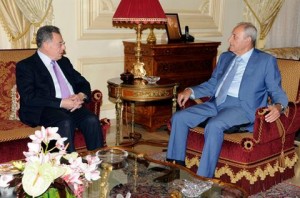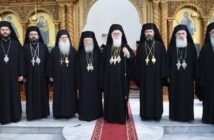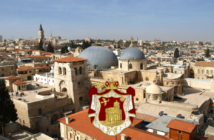Source: The Daily Star – Lebanon
By Wassim Mroueh
BEIRUT: Former Prime Minister Fouad Siniora expressed the willingness of the Future Movement to discuss a draft electoral law that combines proportional representation with a winner-takes-all system during a meeting with Speaker Nabih Berri Friday, said a source close to Berri.
“Former Prime Minister Siniora expressed his party’s openness to discuss the draft law which the parliamentary subcommittee is currently studying,” said the source, describing the meeting between the two as positive.
Siniora, who heads the Future parliamentary bloc, had lunch at Berri’s residence after the meeting. Future Movement MP Nuhad Mashnouq and Mohammad Shatah, an aide for Hariri, also attended the meeting.
A source close to Siniora told The Daily Star the talks went well, although Berri and Siniora did not reach a consensus on a specific draft electoral law.
“The meeting was good, all proposed draft electoral laws were discussed, but no agreement was reached.”
Rival parties are currently deadlocked over which electoral law should be used in June’s parliamentary polls.
A parliamentary subcommittee representing various political groups will resume Monday to discuss a draft law proposed by Berri. It combines proportional representation and a winner-takes-all system.
The Lebanese Forces, Kataeb Party, Free Patriotic Movement, Marada Movement, Amal Movement and Hezbollah have voiced their support for a draft law proposed by the Orthodox Gathering. It stipulates that every sect elect its own MPs under a proportional representation system and represents Lebanon as a single district. The Christian parties argue that the proposal allows Christians to elect all of their 64 MPs in a representative manner unlike in the current situation.
But the Future Movement and the Progressive Socialist Party oppose the law on the grounds that it enhances sectarian sentiment, and have called for adopting a winner-takes-all system.
President Michel Sleiman said that his reason for supporting changes to the 1960 law, on which the 2009 elections were based, is that it led to polarization between factions and to some sects being dominated by one party.
“Our goal is to have a better law that is similar to our pluralistic democracy for which we are distinguished, one that leads to the realignment of political blocs not based on sects and ends hegemony in some sects,” he said, addressing members of the Lebanese Army at a base he visited in Tyre.
In an indirect reference to the Orthodox proposal, Sleiman said that Lebanon should not have an electoral law that fosters extremism in sects.
“It is better to have a pluralistic law which reflects the national unity for which we were distinguished since our independence,” he said.
Shatah said the sectarian concerns of some groups were legitimate, but added that some parties were exaggerating the dispute for political gains.
Speaking to the Central News Agency, he added that these legitimate concerns should be addressed in depth. “We proposed establishing a senate [in which sects are represented]to address the concerns of sects,” he said.
Separately, the LF parliamentary bloc said it would continues to honor its alliance with the Future Movement despite differences over the electoral law. “The bloc highlights the solidity of the March 14 alliance that continues to represent a patriotic orientation based on the historical act of the Lebanese people in 2005 for the sake of freedom, sovereignty and independence,” LF said in a statement.
“Thus, and regardless of differences over the electoral law, the Lebanese Forces adheres to the most to its solid alliance with sovereign groups, with the Future Movement in the forefront,” the bloc added.
It said that the Orthodox proposal was supported by the majority of groups represented in the subcommittee. The bloc said it was still open to discuss any alternative draft law that enjoys the support of most Lebanese parties and provides fair representation in line with coexistence.
Meanwhile, the U.S. Embassy reiterated calls for Lebanon to hold parliamentary elections on time, saying it was the Lebanese who should decide which law should govern the polls.
“Lebanon will decide under which law elections are held; U.S. encourages mechanism that ensures free, fair and transparent elections,” the U.S. Embassy tweeted. “U.S. renews its call for Lebanon to uphold democratic principles and hold elections on time.” United Nations Special Coordinator for Lebanon Derek Plumbly also highlighted the importance of holding parliamentary elections on time after visiting Maronite Patriarch Beshara Rai at Bkirki.
“I welcomed the resumption of active discussions on the electoral law and the Patriarch’s support for this political process and the importance of holding the elections on time in line with Lebanon’s constitutional requirements,” he said. “It is important that Lebanon remain a model for democracy and for a genuine and vital political life in the region.”
A version of this article appeared in the print edition of The Daily Star on January 19, 2013, on page 1.



